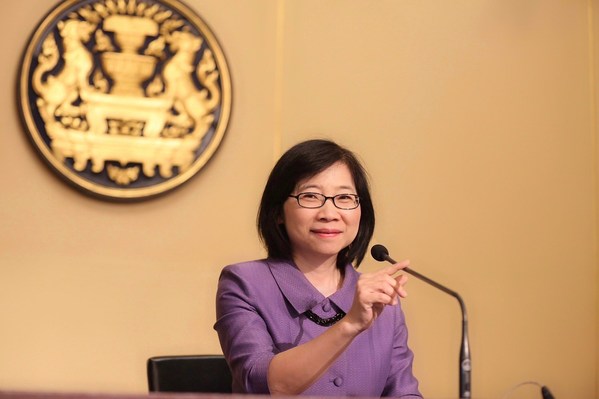BANGKOK, Nov. 4, 2020 /PRNewswire/ -- The Thailand Board of Investment (BOI) today approved the roll out of a comprehensive set of incentives covering all major aspects of the electric vehicles (EV) supply chain, with a focus on battery electric vehicles (BEVs), local production of critical parts, and the inclusion of commercial vehicles of all sizes as well as ships. The board also approved 35.7 billion baht (USD1.1 billion) worth of large investment projects in several sectors.

4 November 2020 - Ms Duangjai Asawachintachit, Secretary General of the Thailand Board of Investment (BOI) spoke to reporters after a board meeting chaired by Prime Minister Gen Prayut Chan-ocha at the Government House in Bangkok. The meeting approved measures to promote investment in electric vehicle production and related supply chain, as well as other measures to promote Thailand's status as regional Medical Hub and Business Hub.
"In line with the Government policy to promote electric vehicles across the board, and to answer the radical changes underway in the global car industry, the BOI today approved a package that will accelerate the development of EV production and related supply chain in Thailand, and allow the entire sector to move into higher gear," Ms Duangjai Asawachintachit, Secretary General of the BOI, said after a board meeting chaired by Prime Minister Gen Prayut Chan-ocha.
New Package for EV
The new promotion package, which replaces the first EV package which expired in 2018, covers a comprehensive range of electrical vehicles, namely passenger cars, buses, trucks, motorcycles, tricycles, and ships. Incentive schemes for these different types of electric vehicles can be summarized as follows:
The BOI also approved to add four more types of EV parts in the list of critical parts, namely high voltage harness, reduction gear, battery cooling system and regenerative braking system. These four categories will all receive 8 years corporate tax exemptions.
To promote local EV battery production, the BOI also approved additional incentives for the production of both battery modules and battery cells for the local market by granting a 90% reduction of import duties for 2 years on raw or essential materials not available locally.
The BOI has previously approved 26 projects producing electric vehicles of various types, including 5 hybrid electric vehicles (HEVs), 6 plug-in hybrid electric vehicles (PHEVs) and 13 BEVs, and 2 E-Bus projects, with a combined production capacity of over 566,000 units per year, BOI data shows. So far, seven of those projects have started commercial operations, namely majors like Nissan, Honda and Toyota for HEVs; Mercedes Benz and BMW for PHEVs; and new comers FOMM and Takano for BEVs. The agency also approved 14 projects to make critical parts for EVs, including 10 battery production projects.
Clinical Research
In order to boost Thailand's competitiveness in health care and to strengthen the country's medical hub status, the BOI approved new incentives to promote clinical research, covering both Contract Research Organization (CRO) and Clinical Research Center (CRC) operations, with 8 years corporate income tax exemptions.
To qualify, the project must spend no less than 1.5 million baht per years on salaries of newly hired researchers who are Thai nationals or invest no less than 1 million baht (not including cost of land, working capital, and vehicles) in the project.
Senior Care Hospitals and Services
In order to prepare for the ageing society, the BOI approved to grant tax benefits for senior or dependent care service businesses.
Reinstatement of the International Procurement Office category
The BOI approved the reinstatement of the International Procurement Office (IPO) category with the aim to strengthen Thailand's position as the regional business and investment hub.
IPO businesses will get import duty exemptions on machinery and raw materials for use in production for exports, as part of the policy to promote the development of the country's supply chain.
Extension of the Productivity Improvement Measure
The deadline for applications to the benefits provided under the Productivity Improvement Measure which covers four measures, has been extended by two years to end 2022. The package of measures, which incentives include a 50% corporate income tax exemption for 3 years, has also been renamed, by deleting the word "production" from its initial name, to make it clear that the measures apply to both the manufacturing and service sectors.
Also, the terms of the measure previously limited to investments in the upgrade of agroindustry operations has been expanded to promote Sustainable Development in related activities in the supply chain, such as furniture factories and paper mills, to encourage the implementation of international sustainability standards, such as the Food Safety Management System (ISO 22000) and Sustainable Forest Management System (ISO 14061).
The four measures under the Productivity Improvement Measure aim to promote energy conservation and alternative energy utilization, production efficiency improvement through machinery upgrade, research and development, engineering designs for efficiency improvement, and sustainable development.
Project approvals
The details of the six large scale projects approved today by the BOI are as follows:
For more information, please contact:
Thailand Board of Investment
Tel. +66 (0) 2553 8111
Website: www.boi.go.th